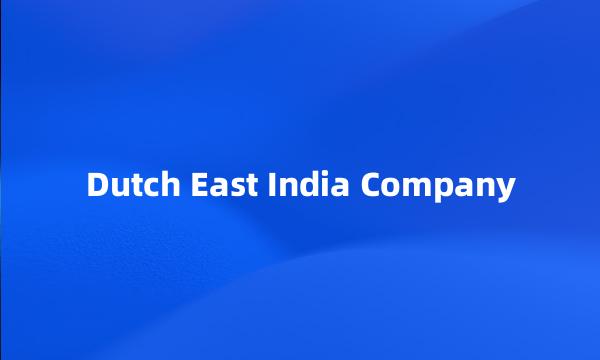Dutch East India Company
- 网络荷兰东印度公司;荷属东印度公司;东印度公司
 Dutch East India Company
Dutch East India Company-
1602 – The Dutch East India Company is established .
1602年的今天,荷兰东印度公司成立。
-
Dutch East India Company uses flutes in large numbers , but other nations have adopted it too .
荷兰东印度公司大量的使用弗鲁特商船的同时,其他国家也有使用。
-
Therefore , this part mainly discusses how the Dutch East India Company developed the Far East Trade of Taiwan-Batavia .
因此,这一部分主要论述了荷兰东印度公司如何发展起台湾&巴达维亚一线的远东贸易。
-
With its advanced navigation technology and flexible trade made , the Dutch East India Company has successfully established its role in Asian market .
荷兰东印度公司凭借着先进的航海技术以及灵活的贸易方式,在早期远东贸易中成功地立足于亚洲市场。
-
The limited spice market of the European determined Dutch East India Company must establish the monopoly of the spice trade .
欧洲香料市场的有限性,决定了荷兰东印度公司必须要建立对香料贸易的垄断。
-
Besides the important trade routes , the trade between the Dutch East India Company and some other countries can not also be ignored .
除了公司的重要贸易干线外,荷兰东印度公司与其他国家间的贸易也是不容忽视的。
-
Replacing the outflow of domestic funds by Asian precious metal is the development advantage of the Dutch East India Company in Far East Trade .
以亚洲的贵金属代替本国资金的流出,是荷兰东印度公司在远东贸易中发展的优势。
-
During the whole trade development process of the Dutch East India Company , Batavia has made different and important significance to the development of this company during every period .
在荷兰东印度公司整个贸易发展历程中,巴达维亚在公司发展的各个时期都有着不同的重要意义。
-
Early 17th century , the Dutch East India Company to carry out the spice trade in Southeast Asia , firstly confronted the competition from Portugal and the UK .
17世纪初,荷兰东印度公司在东南亚开展香料贸易,首先面对的是来自葡萄牙和英国的竞争。
-
Because all land in these areas belonged to the Dutch East India company , the Dutch were able to profit enormously from collecting heavy rents from the Chinese tenants .
因为这些土地都数于荷兰东印度公司,荷兰人得以从高价租金赚取大额利润。
-
From 20s to 80s in the 17th century , the Dutch East India Company has completed basic monopoly of nutmeg , cloves and pepper in Southeast Asia .
从17世纪20年代到80年代,荷兰东印度公司先后完成对东南亚肉豆蔻、丁香和胡椒的基本垄断。
-
Some original data suggests that the proportion of sugar in the bulk cargo trade in the Dutch East India Company shows that sugar trade played an important role in the Dutch East India Company trade .
通过原始数据,推测蔗糖在荷兰东印度公司大宗货物贸易中所占的比例,从而得出蔗糖贸易在荷兰东印度公司贸易初期的重要性。
-
To achieve this goal , the Dutch East India Company invested enormous financial , military , manpower to compete with other European colonists and the native rulers throughout entire 17th century .
为了达到这个目标,整个17世纪,荷兰东印度公司投入巨大的财力、武力、人力展开与其他欧洲殖民者和本土统治者的争夺。
-
Early 17th century , the Dutch East India Company stood out quickly in the spice trade competition , with its powerful economic and military strength , advanced shipbuilding and marine technology , iron-fisted monopoly policy .
17世纪初,荷兰东印度公司凭借其强大的经济和军事实力、先进的造船以及航海技术、铁腕的垄断政策,迅速地在香料贸易的争夺中崭露头角。
-
From 1620s to 1660s , in many trade networks with Batavia being the center , the trade route of Taiwan-Batavia was the lifeline of the Dutch East India Company .
17世纪2060年代,在以巴达维亚为中心的众多贸易网络中,台湾巴达维亚为主的贸易航线是荷兰东印度公司贸易的生命线。
-
Rely on more powerful military and economic power of Dutch East India Company , the Dutch East India Company accounted for completely the upper hand in battle with Portugal and Spain in the first decade of the 17th century .
由于荷兰东印度公司更强大的军事和经济力量,17世纪头十年,荷兰东印度公司在与葡萄牙、西班牙较量中占明显上风。
-
The main problems explored of this paper are reasons of the rise of the sugar trade , types of sugar , trade patterns , profit and the influence of sugar trade in the Netherlands , the Dutch East India Company , Taiwan , Batavia , Europe , Asia .
本文探讨了荷兰东印度公司蔗糖贸易兴起的原因、经营的蔗糖种类、蔗糖贸易的方式和利润及蔗糖贸易对荷兰、荷兰东印度公司、台湾、巴达维亚和欧洲及亚洲社会生活所产生的影响。
-
The Dutch influence started with trading by the Dutch East India Company ( VOC ) expanded its region of influence and its grip on political matters .
这股荷兰的影响力以荷兰东印度公司(DutchEastIndiaCompany)(VOC)的贸易为起点,扩大到政治上的控制。
-
The tale first made its way to our parts over a hundred years after it took place courtesy of Isaac Titsingh , a Dutch merchant and scholar who did business with the Tokugawa shogunate of Japan on behalf of the Dutch East India Company .
一百多年后,这个故事第一次出现在书中,由艾萨克·蒂辛格讲述。蒂辛格是一位荷兰商人兼学者,他代表荷兰东印度公司和日本德川幕府做生意。
